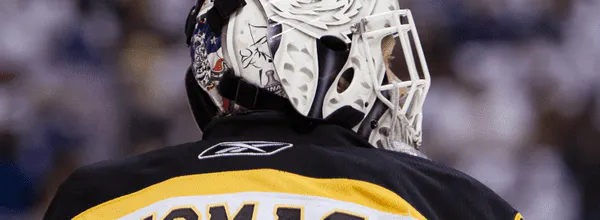Ten Reasons Why the Bruins Beat Vancouver

Alexander Monaghan runs both NHLHotStove.com and Daily Faceoff. In fairness to both audiences, this short piece will run cross-promotionally. Stay tuned for additional coverage on the Stanley Cup Finals from both excellent writing staffs.

Tonight, the Boston Bruins hoisted the Stanley Cup for the first time since 1972, turning Beantown back into a hockeytown.
Bostonians can now bask in the fact that their four franchises all earned the highest honors in their respective sports in the shortest time period. In short, the city has bragging rights.
When the series first began, we wondered how this Bruins team would react to such a powerhouse in the Vancouver Canucks as the latter was fresh off an impressive and decisive Western Conference Finals victory over the San Jose Sharks, taking the matchup in the only five games.
Meanwhile, the Bruins were just this same, blue collar team. They fought hard against the Montreal Canadiens, dominated a Pronger-less Philadelphia Flyers and snuck by a cinderella story in the Tampa Bay Lightning, stealing their identity with Nathan Horton‘s Game 7, overtime game winner. If you were to ask me, I thought they were out of the playoffs in each respective series but clearly what do I know.
As an up-and-down team during the regular season, this group seemed to win the Northeast Division by default. The Canadiens struggled down the stretch due to their beat-up blue line. Their only other competition, the Buffalo Sabres, needed to be one of the best teams in hockey just to make the show. Both the Toronto Maple Leafs and Ottawa Senators improved later into the season but still finished in the bottom-10 in overall standings.
To say the least, this team became an underdog despite their high seeding and Vezina/Norris Trophy finalists.
We know they were not expected to win. However, what we are more concerned about is explaining exactly why this Bruins team actually won this series when most pundits put them out of the Cup in six or seven. Instead of breaking out the tape and analyzing this series in a game-by-game basis we found ten solid reasons why this team takes possession of Lord Stanley’s goblet and 29 other teams regroup for another grueling season.
Without further ado, we bring you a plethora of reasons why one team came away victorious.
- Tim Thomas. Thomas was an absolute rock. He never allowed more than three goals, and never allowed more than two in regulation. When all the media focused on the struggles of Roberto Luongo and how he would handle the pressure, Thomas once again took control of the game and ultimately took home the Cup. He carried a very strong, record breaking season into the playoffs and never looked back. When anyone doubted him, or attempted to pump his tires he never looked back. With his back up against the wall, he stopped the last 73 of 75 shots, winning both games including a 37-save Game 7 shutout. There is absolutely no chance he would not have won the Conn Smythe as the 2011 Stanley Cup Playoffs MVP.
- Motivation. Horton left the series early into Game 3. As their most clutch performer, the team clearly needed him as he scored the game winner in two Game 7 overtime wins. Although he would not return to the series, the team hoisted the motto of “Do it for Horton.” The first-year playoff performer served as a motivator, showing up for Game 6 and then pouring water from the TD Garden ice onto the ice in the Rogers Arena prior to Game 7. The hit served as the turning point of the series as Aaron Rome used too much force to injure a player while his team was up in the series 2-0, changing the momentum as a result.
- Physical Play. Dan Hamhuis got knocked out of the series after playing only 8:09 in Game 1. Mason Raymond left in Game 6 and may never skate the same again. The walking wounded of Christian Ehrhoff, Ryan Kesler and Alexander Edler were all consistently pounded to the point where they were rendered ineffective. Rome tried to answer their physicality but wound out missing the rest of the playoffs.
- Efficient defense. The top defensive pairing of Zdeno Chara and Dennis Seidenberg not only shut down their opponent’s top line, they also improved their teammates’ games by doing so. Johnny Boychuk and Andrew Ference played excellent hockey on both end of the ice mainly due to their team-low quality of competition in 5×5 situations. Additionally, they also displayed much better zone rate finishes, making what should have been a weakness in a third pairing into a strength.
- Primary Scoring. David Krejci finished the playoffs as the points leader with 23 during the 2011 NHL Playoffs. His chemistry with winger Milan Lucic allowed Michael Ryder and eventually Rich Peverley to continue to contribute in the offensive zone, quietly outplaying some of the best players in the League.
- Secondary Scoring. Just like the Krejci line, the secondary scoring was just better. Most of the talk surrounded Kesler as the firepower on Vancouver but the second line with Brad Marchand, Patrice Bergeron and Mark Recchi stepped up in time of need. The troika combined for an even more impressive four goals and six points in Game 7, leading their team to the Cup.
- Forechecking. When the team was able to establish their forecheck, they created all kinds of problems for The Sedin Twins, Alex Burrows and Kesler not to mention the defense. They forced turnovers, took advantage of bad line changes and put pucks behind Luongo before he ever saw them coming. Combined with their physical play, the Bruins used their cumulative team speed to out-work and simply out-play their opponents.
- Discipline. Unlike the Canucks, the Bruins never seemed flustered. They rarely took bad penalties and honestly head coach Claude Julien would not allow it. They maintained their focus throughout the series, allowing the Canucks to play themselves out of the series due to frustration and simply not being the better team.
- Perseverence. Down 2-0 in the series, they won two straight. Down 3-2 in the series, they sweep a series of two. They came back from their initial series 2-0. These guys were the ultimate comeback kids, never down and out.
- Leadership. Neither team held a great deal of experience but keeping both Recchi and enforcer Shawn Thornton in the lineup helped the younger group gain confidence. Since his return in Game 3, Thornton acted as a voal leader for the rest of the series, taking a good deal of interviews after the game and showing his love for the city of Boston. These two in addition to seasoned veterans like the captain Chara gave this team a winning direction and identity.
These grouling playoffs are over. Congratulations to the 2011 Stanley Cup Champion Boston Bruins. You guys earned it and should be ready to defend that title in a few months.